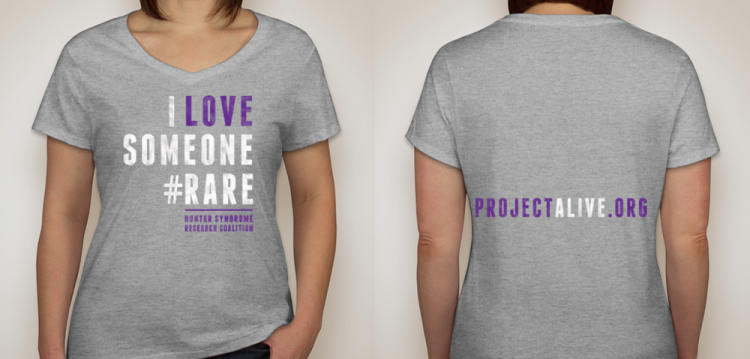7 Questions to Ask Yourself If You Think Rare Disease Day Doesn’t Apply to You
But on the flip side, that means nine out of 10 Americans do not have a rare disease. Why should they give a flying flip about rare diseases or Rare Disease Day? Of course, some percentage of those people may have someone with a rare disease in their immediate family or extended family, but that still leaves a large portion of the population “unaffected” by rare disease.
If that’s you, why should you care about Rare Disease Day, coming up on February 29? Here are seven questions to ask yourself:
1. Are you or will you be a parent?
When 2009 began, I had three healthy children — or so I thought. Rare Disease Day didn’t apply to me until April 2009, when my youngest son was diagnosed with Hunter syndrome (also known as MPS II), a disease that affects one out of 162,000 live births, according to HunterPatients.com. Although it’s a genetic disease, his was caused by a spontaneous mutation that can happen upon conception, most of which are often not tested for in the womb (reminder: there are almost 7,000 rare diseases, many of which have multiple different mutations that cause them). In many genetic diseases, children (sometimes even into adulthood) appear healthy until the disease begins to manifest itself. One day your child is just a kid. And then the next day, you may find out he’s dying. That may never be you. But it could be.
2. Are you or will you be a grandparent?
Sometimes grandparents or other relatives notice things that (often overwhelmed) parents don’t even see. My mother actually helped diagnose my son after she watched an episode of the series “Mystery Diagnosis” about, you guessed it, a boy with Hunter syndrome. His symptoms were so mild neither his doctor nor I picked up on them. Neither did the several specialists he’d seen for various reasons in his first two years of life. There are countless other stories of an aunt here or a cousin there who helps point their relative in the direction of a rare disease diagnosis.
3. Do you work in a school?
There are good odds that at least one child (or teacher!) in your school has a rare disease. Why does that matter to you? Well, remember those grandparents or other family members who notice things? You spend many hours a day with children, and you may notice things, too. Now, of course, sometimes it’s not your place to say anything, but some circumstances can be unique. And sometimes parents freely share their child’s unique diagnosis. Knowing more about a particular rare disease and how you can support that child in a school setting may help you be better at your job.
4. Do you work in health care?
Those who are eventually diagnosed with a rare disease report that it takes on average 7.6 years in the U.S. and 5.6 years in the U.K. to receive a diagnosis. During that journey, on average they see eight physicians — four primary care and four specialists. Even if you are not a physician, imagine all the nurses they see in that process, all the waiting rooms they sit in. Some patients have even been directed toward a diagnosis by another family sitting in the waiting room. And for patients already diagnosed, health care can look very different. They often have multiple specialists, just for the symptoms of their rare disease. I believe awareness of and support for rare diseases is key for anyone working in health care.
5. Do you have health insurance?
Often the medications developed for rare diseases can be quite expensive. While rare disease medications are currently a small percentage of the overall health care spend, as more treatments are developed, the policies surrounding rare disease pricing become important to all of us, considering health insurance ratings and health policy in our respective countries.
6. Do you visit Dr. Google?
One in three Americans has gone online to figure out a medical condition. It could be an ear infection or toe fungus, but sometimes, it could be something more rare. Being aware that rare diseases do exist, of when to see a specialist, and when and how to connect the dots of seemingly unrelated symptoms to push for a diagnosis can shave years off the search for a rare disease diagnosis.
7. Do you have 10 friends?
If you’ve made it through the above and still none of them apply to you, you might just live on a solitary island in the Pacific. Since you’re reading this on the web, I’m guessing not, and I’m guessing you have at least 10 friends. If so, then chances are at least one friend in your life has a rare disease, or has a child, spouse or parent with a rare disease. One way to support that friend is to help them raise awareness on Rare Disease Day on February 29, 2016, or to fundraise in support of an organization for the disease that affects them; for example, through our “I Love Someone #Rare” campaign.
Rare Disease Day is our call to arms as a rare disease community. Join us.

This post originally appeared on Saving Case. Follow this journey on My unPlanned Son.
The Mighty is asking the following: Create a list-style story of your choice in regards to disability, disease or illness. It can be lighthearted and funny or more serious — whatever inspires you. Be sure to include at least one intro paragraph for your list. If you’d like to participate, please send a blog post to community@themighty.com. Please include a photo for the piece, a photo of yourself and 1-2 sentence bio. Check out our Submit a Story page for more about our submission guidelines.
